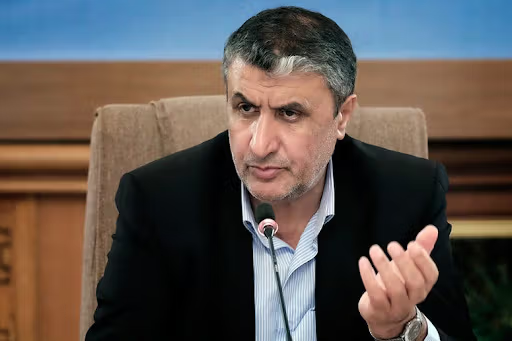Iran's Nuclear Chief Blames Israel For ‘Terrorist’ Attack On Nuclear Site

Mohammad Eslami, the head of Iran's nuclear organization has told reporters that Israel was responsible for an attack on one of its nuclear facilities in June.

Mohammad Eslami, the head of Iran's nuclear organization has told reporters that Israel was responsible for an attack on one of its nuclear facilities in June.
Earlier on Sunday he told the Russian Sputnik news agency it was regrettable that neither the UN nuclear watchdog, IAEA nor "the countries that have made monitoring claims against" Iran have condemned the "terrorist act" that severely damaged a centrifuge component manufacturing workshop in Karaj, near Tehran, in June.
"Not condemning a terrorist act at an official site under IAEA supervision is tantamount to supporting terrorists," Eslami said in an exclusive interview with Russia's Sputnik news agency Sunday. Iran so far had not officially named Israel or any group as responsible for the attack on the Karaj facility but has accused Israel for the April attack on the Natanz enrichment facility.
Iran and the IAEA have been in a standoff in recent weeks over Tehran's denial of access to IAEA inspectors to service the equipment at the at the TESA Karaj Complex, in north-central Alborz province. Since February Tehran has limited IAEA inspections. The IAEA says the limitations have seriously affected its monitoring activities. The European Union-brokered nuclear talks aimed at restoring the JCPOA that began in Vienna in April were also suspended in June after six rounds of talks and Iran is not showing an active interest in resuming them.
Denial of access to IAEA inspectors can be interpreted as a toughening of Iran’s position in its dealings with the international community over its nuclear program.
Many believe that Tehran is stalling the resumption of talks over reviving the Joint Comprehensive Plan of Action (JCPOA), to add to its highly enriched uranium stockpile to strengthen its position in any future talks with more bargaining chips. Western powers are concerned that the delay in resumption of Vienna talks, and Iran's further violations of its commitments under the deal including higher enrichment levels and stockpiling of highly enriched uranium, may destroy any chances of restoring the deal.
Although the JCPOA only allows Iran to enrich uranium to the level of 3.67%, Tehran has continuously increased its enrichment level since the US withdrawal from the deal in 2018. Tehran has increased its stockpile of 60% enriched uranium from 2.4kg in May to 10kg in August according to IAEA estimates. The amount of 20% enriched uranium has also gone up from 62.8 to 84.3kg.
Meanwhile, it appears that Tehran is seeking concessions from the US to return to the talks. Foreign Minister Hossein Amir-Abdollahian in an interview with the state-run television (IRIB) said while in New York recently, he demanded the release of $10 billion of Iran's frozen funds by the US as a good will gesture to encourage Iran to resume the talks.
Eslami who had earlier on September 30, called the recent report of the International Atomic Energy Agency (IAEA) on access to monitoring cameras at the Karaj facility "unconstructive" and the IAEA director general's statements about man-made uranium particles at three Iranian sites "false", charged in the interview with Sputnik that the issue of man-made uranium particles was "false news" which a "terrorist group -- presumably the Mujahedin-e-Khalq organization – is actively promoting. "The IAEA, as an international body, should not fall for these tricks and become a puppet in the hands of this terrorist group," he declared.